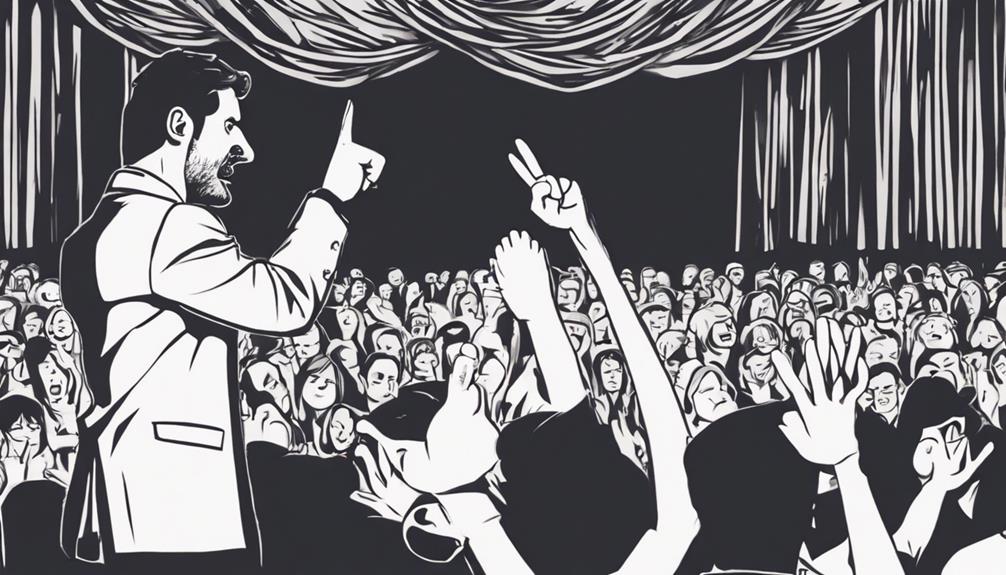Stage hypnosis is an entertaining performance relying on suggestibility and audience participation, not mind control. Volunteers willingly engage and are respected by hypnotists who prioritize safety. Hypnosis is temporary, with individuals easily brought out if needed. Its effectiveness varies per person based on susceptibility, traits, and goals. Misconceptions of being trapped or fake are dispelled by skilled hypnotists showcasing the power of suggestion. Understanding the nuances of stage hypnosis can provide insight into this intriguing art form.
Stage Hypnosis Is Mind Control

Contrary to popular belief, stage hypnosis is not a form of mind control but rather a performance art that relies on suggestibility and audience participation. This form of entertainment often raises ethical considerations due to its manipulation tactics. While the hypnotist may appear to have control over the participants, it is essential to understand that individuals under hypnosis cannot be forced to act against their will.
The entertainment value of stage hypnosis lies in the interaction between the hypnotist and the audience. Audience participation is a key element in the success of a stage hypnosis show. Volunteers willingly join the stage, intrigued by the opportunity to experience hypnosis firsthand. The hypnotist then guides them through various suggestions, creating a fun and engaging spectacle for onlookers.
It is crucial to differentiate between the perception of mind control and the reality of stage hypnosis as a collaborative and entertaining performance. By understanding the principles of suggestibility and audience participation, one can appreciate the artistry behind stage hypnosis while acknowledging the ethical considerations involved.
Participants Act Against Their Will
One common misconception about stage hypnosis is that participants are forced to act against their will during the performance. However, it is important to understand that individuals who volunteer to participate in a stage hypnosis show are fully aware of the nature of the performance. They are willing participants who are eager to engage in the entertainment experience.
Ethical concerns often arise when discussing stage hypnosis, particularly regarding the idea of individuals being controlled or manipulated against their will. It is crucial to emphasize that stage hypnotists work within a set of ethical guidelines to ensure the safety and well-being of all participants. These professionals are trained to create a fun and engaging environment while respecting the boundaries and dignity of the volunteers.
It is essential to recognize that stage hypnosis is primarily a form of entertainment. Participants are not coerced into behaving in a certain way; instead, they are encouraged to let go of inhibitions and enjoy the experience. By understanding the distinction between entertainment value and ethical considerations, one can appreciate the lighthearted nature of stage hypnosis shows.
Hypnotized Individuals Can Get Stuck

Is it possible for hypnotized individuals to get stuck in a hypnotic state?
While it is a common fear, the reality is that individuals cannot remain hypnotized indefinitely. Hypnosis is a temporary state of focused attention that can be easily interrupted by external factors or the hypnotist themselves.
However, there are potential dangers associated with the misconception that someone can get stuck in hypnosis. This belief may lead to anxiety or distress in individuals considering undergoing hypnosis therapy or participating in stage hypnosis shows.
Ethical considerations also come into play when discussing the idea of getting stuck in hypnosis. It is essential for hypnotists to prioritize the well-being of their participants and ensure they are properly trained to guide individuals in and out of hypnosis safely.
Misinformation about being trapped in a hypnotic state can create unnecessary fear and hinder the potential benefits of hypnosis. By understanding that hypnosis is a temporary and controllable state, individuals can feel more at ease exploring its therapeutic or entertainment aspects.
Hypnosis Works the Same for Everyone
While hypnosis is a versatile tool that can be beneficial for many individuals, it is important to recognize that the effectiveness of hypnosis can vary from person to person. Individual susceptibility plays a significant role in how a person responds to hypnosis. Some individuals are highly responsive to hypnotic suggestions and can enter a trance-like state more easily, while others may require more time or may not respond as strongly.
It is crucial to understand that each person's experience with hypnosis is unique. Factors such as personality traits, beliefs, and past experiences can influence how effectively someone can be hypnotized. Additionally, the goals individuals have for undergoing hypnosis can impact their overall experience. Some may seek hypnosis for relaxation or stress relief, while others may aim to overcome specific challenges or habits.
In essence, hypnosis does not work the same for everyone. The varied experiences individuals have with hypnosis highlight the importance of recognizing and respecting each person's individual susceptibility to this technique.
Stage Hypnosis Is Fake

Commonly misunderstood, stage hypnosis is often perceived as fake due to misconceptions surrounding its theatrical nature. This form of hypnosis entertainment involves skilled hypnotists performing in front of live audiences, engaging in interactive demonstrations that rely on audience participation. While some skeptics believe that the participants are merely playing along or acting, it is essential to understand that stage hypnosis is a real phenomenon rooted in the power of suggestion and the subconscious mind.
Audience participation is a crucial element in stage hypnosis shows, where volunteers willingly join the hypnotist on stage to experience the effects of hypnosis in a fun and entertaining setting. These volunteers are not hired actors but regular audience members who are open to the experience and willing to follow the hypnotist's instructions.
The hypnotist's ability to guide these individuals into a hypnotic state showcases the genuine impact of hypnosis on the subconscious mind, leading to the entertaining and often hilarious displays seen on stage. While the theatrics and showmanship may heighten the entertainment value, it is important to recognize that stage hypnosis is a real demonstration of the power of suggestion and the mind's responsiveness to hypnotic techniques.
Frequently Asked Questions
Can Stage Hypnosis Cause Long-Term Psychological Harm?
Stage hypnosis presents potential risks for long-term psychological harm due to the manipulation of participants' subconscious minds. Ethical concerns arise regarding consent and the impact of suggestive practices. It's crucial to prioritize participant well-being in such performances.
Do Participants Remember What Happens During Hypnosis?
During hypnosis, participants may experience altered memory recall due to heightened suggestibility. Some may remember their experiences vividly, while others might have fragmented recollections. The participant's unique psychological makeup can influence the depth of memory retention.
Can Anyone Be Hypnotized Against Their Will?
Hypnosis relies on cooperation and willingness; it cannot force someone against their will. Ethical boundaries dictate that consent must be freely given for any hypnotic session, ensuring respect for individuals and avoiding potential consent issues.
Is Stage Hypnosis Considered a Form of Therapy?
Stage hypnosis is primarily an entertainment form where participants engage in playful acts under hypnosis. While it may have psychological impact, it is not considered a therapeutic practice due to ethical concerns surrounding consent and potential harm.
Are There Any Risks Involved in Participating in Stage Hypnosis?
Participating in stage hypnosis carries potential dangers, such as psychological distress or unintended physical actions. To mitigate risks, attendees should research the hypnotist's credentials, understand the process, and ensure a safe, supportive environment. Safety precautions are essential.
Conclusion
In conclusion, it is important to understand that stage hypnosis is not mind control. Participants are not acting against their will. Individuals cannot get stuck in a hypnotized state. Hypnosis works differently for everyone. Stage hypnosis is not necessarily fake.
By dispelling these common misconceptions, we can gain a better understanding of the true nature of stage hypnosis and appreciate it as a form of entertainment rather than manipulation.